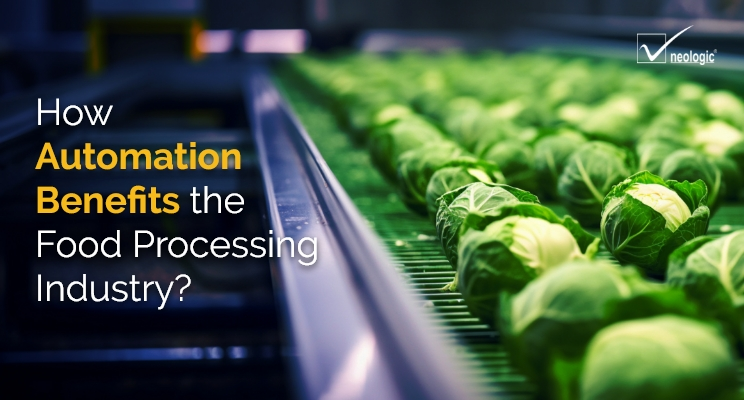
How Automation Benefits the Food Processing Industry?
Automation is one of the most effective methods that is succeeding in modern times. It is seen that the majority of food processors are adopting automated techniques. In the food industry, the use of automation has brought in many benefits like reduced labor costs, improved efficiency, reduced risk of human errors or contamination, etc. It has also ensured that high food safety standards are met.
Automation in food production allows food processing machine manufacturers to maintain production quality, minimize waste, and improve efficiency allowing them to invest time in other business areas. This can be achieved with robots, artificial intelligence, and IoT, believe it or not, these systems can operate alongside and boost the overall performance.
Benefits of Automation in the Food Processing
Automation is revolutionizing the food manufacturing industry for the greater good. The increasing demand for food products and changing consumer trends have turned food processors towards automation as it can enable faster and more efficient production processes. It can also benefit you if you are manufacturing, assembling, or shipping and it's difficult to fully monitor the process.
Here’s how automation benefits the food processing industry:
- Improved Quality Control
- End-To-End Traceability
- Increased Work Place Safety
- Enhances Efficiency
- Boosts Brand Reputation
- Offers Flexibility
Improved Quality Control
With automation in place, you can ensure that the consistency and quality control in food production is optimum and uniform. Along the supply chain, there are numerous processes, employees, and touchpoints involved. This can make it challenging to observe the food and monitor the quality. Automated systems can be programmed to ensure the production to the same specifications every time, ensuring that the end product is of consistent quality.
You don’t want contaminated or faulty products entering the market as it can be detrimental to the business and your consumers’ health. Food must always stay traceable and safe, but it is challenging to secure a system with so many working gears.
But with automation here, that can completely change. With the proper systems, defects, and concerns can be discerned much earlier in the process. By identifying problems during processing or packaging, you can significantly lower the total number of problematic goods entering the market.
End-To-End Traceability
Traceability is a significant aspect of retailer compliance for food manufacturers in the food processing industry. End-to-end traceability offers data for more than just keeping an eye on the food. The data you get can help build a detailed profile and predictive system for future profitability.
A food processing plant can collect information in abundance about the condition and location of a food item with automated tracking solutions. Accurate tracking of food items can help control material flow or determine the best combination of ingredients. A food processor can also deploy tools and automation solutions for food processing plants to track the products from inception to fulfillment.
Real-time monitoring and data collecting have been made possible by the integration of Internet of Things (IoT) technology into food manufacturing operations, which has enhanced decision-making and production procedures. Bigger food companies can benefit from automation's capacity to streamline processes. To improve traceability, some companies are already utilizing this technology in conjunction with IoT devices.
Increased Work Place Safety
Automation is often used to control rote, monotonous, and sometimes even dangerous tasks. It also frees up your workers to handle the more critical demands. The workers in food manufacturing plants are constantly exposed to chemical hazards, blades, heat, and extreme noise. So, it can be effective for countermeasures as it deals with the risk of dirty, dull, and dangerous, the ‘three D’.
The improved safety and protection of your dedicated workforce can help alleviate operational or maintenance expenses in the long run. It can cause faster and more widespread adoption of current standards and regulations for all of your workforce as well.
Enhances Efficiency
It’s no secret that when automation systems or machines are developed and deployed correctly, they can perform tasks faster and better than human workers can, at least in some instances. A machine doesn’t tire, it doesn’t feel bored, and it cannot slack off—not unless in cases where it malfunctions. Automation in food processing is sure to increase performance and productivity for many processes.
To reap the benefits of automation in the food industry in terms of productivity and efficiency, you might just need to include a few automated solutions in your processes. Apart from increasing machine efficiency, automation also has a positive impact on the employees’ efficiency. Employees are relieved from repetitive tasks and can add value to tasks that require human intervention and know-how.
Provides Flexibility
With the food processing industry changing rapidly, automation can help food manufacturers adapt to change with ease. The food processing manufacturers can easily increase the flexibility of their food processing lines as per the market demand. They can increase the flexibility of one segment without slowing down the production of other food segments. Digital automation systems are more easily repurposed to adjust to new technologies. The ease of scaling up and down for automated systems is possibly even more significant.
In Conclusion, the advantages automation offers in the food industry like food quality, scalability, lowered costs, etc., can help human workers function faster, better, and safer. As the industry’s growth is projected to continue, food manufacturers must adopt to automation technology. This is to keep up with the rising consumer demands while maintaining high safety and quality standards. Implementing end-to-end automation solutions and with recent advancements, food manufacturers can develop systems that reduce waste through real-time data, improve production processes, provide more accurate stock tracking, and be effective and efficient.
Webinar: IoT Ready Food Processing Industry
Understand how the food processing industry is Internet of Things (IoT)-ready in our Emerging Food Tech Webinar series.